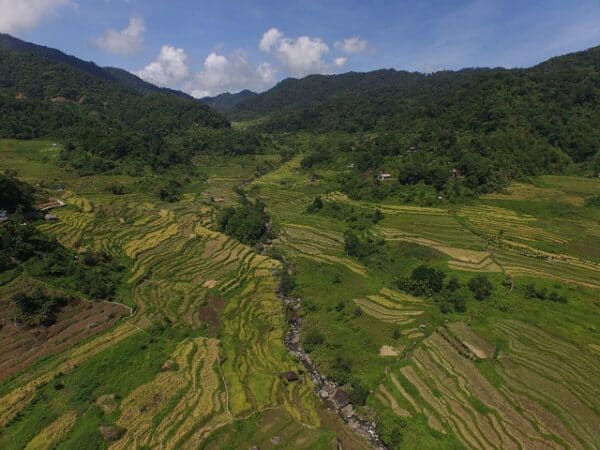
via Rappler, 14 April 2019: Stephen Acabado and Marlon Martin have been conducting archaeological research in the Ifugao Rice Terraces in recent years, and have revised the date of the terraces, once thought to be 2,000 years old, to a more recent 200-400 year time period. It’s understandable why there is resistance to this idea (older is better), but more important is to be able to set the record straight.
Recent research suggests the 2,000-year origin narrative is wrong and is colonial in nature. When we say colonial, we refer to a narrative that devalues local realities, imposing instead an outside version of what possibly could have been. Many historians and tour directors romanticize the 2,000-year-old origins that early anthropologists claimed for the terraces. This romanticism perpetuated a historically-flawed narrative of the Ifugao as a people and as a culture. It also reinforced lowland perception of their highland compatriots as being backward and unchanging. In the wider scale of human history, complex agricultural societies developed on to become kingdoms and empires; yet if the Ifugao developed irrigated agriculture 2,000 years ago, does it mean that they didn’t do anything but plant rice for two millennia?
The terraces are the products of a very rich and complex Ifugao culture that resisted the Spanish conquest for more than 200 years. Archaeological digs show they were converted to wet rice as a strategy to consolidate economic and political resources that allowed them to resist the marauding Spanish forces less than 400 years ago. It cemented the social order, unified the Ifugao against invasion, and sealed a social organization that maintained the terraces and preserved these mountain settlements. By insisting on the 2000-year narrative, this important era of colonial resistance and sustained war for independence in Ifugao and the Cordilleras is relegated as minor events in the history of the country.
Source: Demystifying the age of the Ifugao Rice Terraces to decolonize history





![[Talk] The Ancient Town of Si Thep in Thailand: A Crossroads of Indianization](https://www.southeastasianarchaeology.com/wp-content/uploads/2024/07/the-ancient-town-of-si-thep-in-thailand-a-crossroads-of-indianization-502-120x86.jpg)










I don’t understand these lowlanders from Manila’s refusal to accept that the Igorots who remained in the same area for 709000 years, as the Rhino bones discovered in Mountain Province has indicated, can’t build anything significant without foreign influences. Does it hurt to accept that the Igorots have sustained themselves independently and successfully through out these Millenniums without the lowlander’s offer of “modernity”?